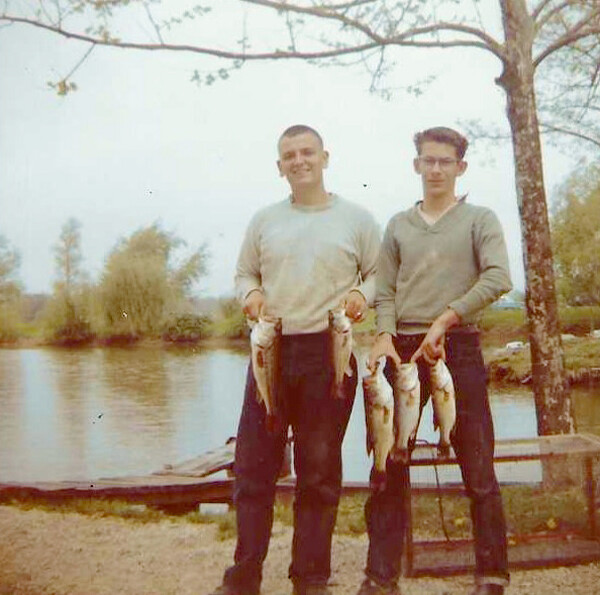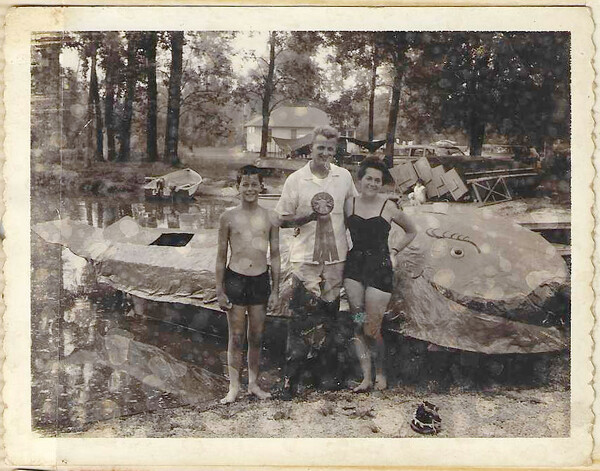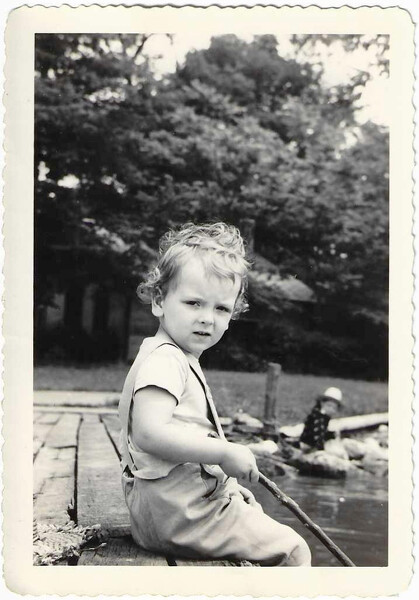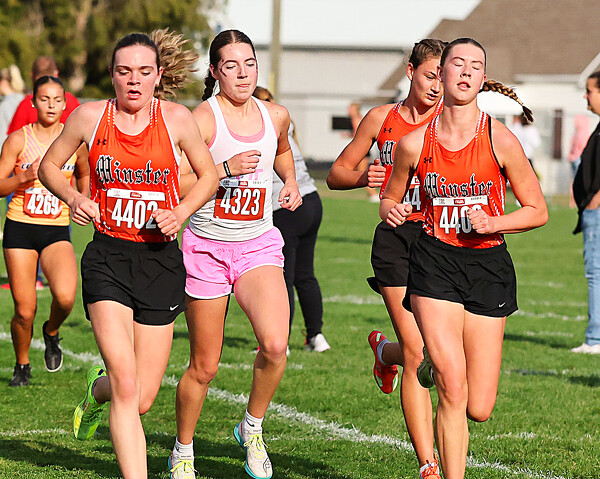
Deane Armour and Eric Bruce, son of Elmo Bruce, pose for a picture. Elmo Bruce bought Park Grand in 1945 with war bonds he had save. Park Grand had cottages, rowboats and a bait house. Eric Bruce and Armour enjoyed fishing on Grand Lake. Armour died at 80 Aug. 26, 2025.
CELINA - Mercer County Historical Society Director Cait Clark places a small device on a table, pushes the record button and waits for her subject to spool out memories.
They may be glimpses into a small family dairy farm decades ago, a recipe handed down over the generations or something a bit daring, maybe illicit, let's say, a candle in the window signaling a fresh batch of bootleg booze is ready for the taking.
"There was a woman. She was talking about how her family were bootleggers. That was absolutely fascinating," the preternaturally passionate Clark related from behind her desk at the Riley House Museum in Celina. "Oh my goodness, she was talking about how they kept their still on the second floor, because who's going to look for a still on the second floor of the house, right?"
There are extraordinary accounts of interactions with German prisoners of war housed at the 4-H camp at Harbor Point, the unearthing of prehistoric elk bones in a peat and marl deposit in Cranberry Prairie and a barn turned into an ad hoc gambling house when a famous gangster and his crew made it to this neck of the woods.
And there's also at least one tale bordering on the downright macabre.
In the now vanished berg of Macedon, founded in 1838 in Washington Township, about 7 miles west of preset-day Coldwater, was a medical school that was believed to be in possession of a human skeleton.
"According to myth and legend, several, several years ago there was a skeleton on display at the Macedon (medical school)," Clark said. "But as the story goes, after the medical school was shut down, they threw the skeleton in a ditch behind the place and apparently for many years, one of those bones was on a display at a local museum around."
But Clark doesn't want people to get the wrong idea: She aims to capture the personal stories of anyone willing to go on record, regardless of how riveting or quotidian they think those reminiscences are.
"We're talking about all these huge events that happen in Mercer County's history, but I don't want people to forget that the most important part about huge events is the small individual perspectives of these events," she said. "No matter how small you think your story is, it's going
to play a huge role in the future of the county's history. I can't illustrate that enough. And even if you think it's small, to the families 50 years from now, it's huge."

Members of the Deeter family stand by award-winning float they put together, Wally the Whale.
The historical society this year launched the Mercer Memories Project to preserve the personal histories of community members, before they're gone forever. Also, museum artifacts, when paired with vocal commentaries, are given a whole new dimension.
"So anyone and everyone, doesn't matter your age, doesn't matter your story, we want to hear about it," Clark told The Daily Standard.
Clark will meet people wherever they're most comfortable. Sometimes, several family members participate in the same interview.
"We can either have them come here (the museum) - I've done a lot of interviews right here in this room with Mercer Memories - but I have also gone to multiple nursing homes," Clark said. "People will hear about it and say, 'Hey, could you interview my grandma?' And I will say, 'absolutely.'"
At least for now, Clark is interested in obtaining only audio recordings, saying the method is less intrusive than a video camera.
"When people have a camera on them, they're very aware of how they look and they don't express mannerisms very much, and those have become really important to the comfort of the people," she said.
Clark sets aside up to 3 hours for interviews, but hasn't reached that mark yet.
"But if it does, I've got interview parts - A, B, C, D of the same person," she said. "We can break it up, and I always suggest to people, 'This is your interview, so if there is anything you want to talk about, don't be afraid to bring in a bulleted list.'"
The more people talk, the more memories become unlocked.
"Especially in the group settings, because sometimes it will just turn into a conversation between the people that are there, and I'm just a bystander," Clark noted. "They'll say, 'Hey, do you remember so-and-so did this with this car out on the south side of the lake?' and someone was like, 'Oh yeah, that happened at the barn where so-and-so played cards or something like that.'"
The group setting tends to reawaken memories that one person might not have otherwise conjured on their own, according to Clark.
"A lot of the interviews I've done have been parents and children and grandchildren, all just having a conversation," she said. "One of my favorite interviews was two nieces with their uncle, actually. I went out to eat with them at a restaurant and I just sat the recorder in the middle of the table, and they just talked about what it was like to grow up on a farm. I mean, it can be as relaxed as anybody wants it to be."

A picture of Deane Armour fishing on Grand Lake. He grew up to be an avid outdoorsman and was very active in many organizations over the years.
Since initiating the project, Clark has interviewed about 20 subjects, some multiple times. "I sit it (the recorder) on the table between us and we reminisce. We've learned all kinds of stuff. We have interviewed former sheriffs. We've interviewed the current sheriff, some judges and lawyers that have retired, farmers. Pretty much anyone and everyone is welcome," she said.
To set things in motion, Clark will often ask her subjects about their very first memory.
"Then a lot of times they will just start talking, and we realize that's important because it shows the authenticity of what is important to these people."
Clark has also spoken with veterans for the project, one of whom has since passed.
"We interviewed him about five times. He was a Vietnam veteran," she said. "We also interviewed the sister of one of our well known veterans around here who did not come home, and his sister had a lot of information to share about what it was like to run around in their group of friends and how his loss impacted them on a very deep personal level."
Clark has also sat down with people who have shared memories of growing up on Grand Lake and details about local parades, downtown businesses and the crop rotations and the kinds of animals raised on farms. One woman recalled how during the Great Depression, her parents would provide food to people in exchange for work on their farm.
"One gentleman was talking about how he used to go out on the lake and he used to go to the old oil derricks," she said "He would climb to the bottom of the lake on these to get anchors that had gotten wrapped around the bottom and he would go and sell them at the fish and tackle shop."
Another question Clark's poses to subjects is what they would like people to know about them 50 years from now.
"A lot of people want to remind the future residents of Mercer County that small town is so important," Clark said. "One of the biggest things is don't lose that personal relationship that's so important between the residents of Mercer County. … We're getting so involved with such a broad world - and that's fine, being involved with the broadness of the world is great - but don't forget to be human with your neighbor."
Clark said she also wants to talk to children and young adults.
"We need those stories too because COVID is going to be history. It's going to show who we were as a nation," she said. "What was it like switching to where you met with your teacher just online? What was it like when you went into the stores and there was no toilet paper on the shelves.? How did you feel?"
The interviews are archived using the historical society's PastPerfect Museum Software.
"It's a museum-specific software where all of our artifacts go, all of our pictures, photographs, newspapers," she explained. "As we're scanning them, they all get put on PastPerfect and so do these interviews. They all get uploaded on PastPerfect and then they also go on a hard drive that is kept off site."
In addition to preserving the stories for posterity, the historical society plans on eventually using the recordings in multiple ways, including on videos and alongside exhibits, such as military and war displays.
"We want their stories when we set up these displays. We want their voices to be playing with these displays because they're the only ones that fit the uniforms that we are going to be representing," Clark said.
Clark stressed that recordings will only be used publicly with the consent of the interviewee.
"We want people to be honest and safe when they're telling their stories to us. That's our top priority," said. "I have some stories that I've heard that are archived and probably won't come out until 50 years from now. Those are flagged just for the comfort of the family."
Those interested in being interviewed of having someone they know interviewed may visit therileyhousemuseum.org, click on the "Get Involved" tab at the top of the website, select Mercer Memories Project and submit their information.
They may also call the museum at 419-586-6065.
"A lot of people don't realize their voices are artifacts," Clark said. "Their stories, their history, their personal history is an artifact in itself, and realizing that for me has been so much fun."
